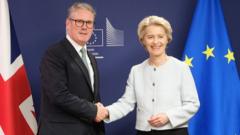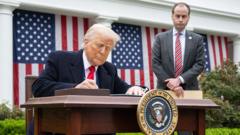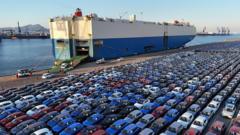This article explores the anticipated UK-EU relations as Prime Minister Sir Keir Starmer is invited to an informal summit, emphasizing the need for security collaboration against a backdrop of geopolitical unrest and economic challenges.
**UK and EU Set for 2025 Reset Amidst Political and Economic Challenges**

**UK and EU Set for 2025 Reset Amidst Political and Economic Challenges**
As the UK prepares for a fresh start with the EU in early 2025 under Labour's leadership, key diplomatic concerns emerge regarding trade-offs and cooperation in a turbulent global landscape.
Seeking to redefine post-Brexit relations, the Labour-led UK government faces skepticism from the EU regarding the feasibility of trade-offs while addressing the complexities surrounding immigration, economic collaboration, and mutual interests.
In early 2025, the landscape of UK-EU relations is set for a potential reset as Prime Minister Sir Keir Starmer has received an invitation to attend an informal summit with EU leaders—marking the first such invitation in years following the tumultuous Brexit negotiations. As Europe grapples with increasing volatility due to ongoing conflicts in the Middle East and the implications of Donald Trump’s potential re-election, the summit's discussions are expected to center on future cooperation in security and defense.
The backdrop of this gathering illustrates the shared values under threat amidst geopolitical challenges. The turmoil experienced by both the EU and the UK since Brexit in 2016 has led to a renewed awareness of their interdependencies, particularly regarding security, trade, migration, and economic stability. Mark Leonard of the European Council on Foreign Relations underscores the essential role of EU relations in fulfilling Labour's priority government pledges.
Labour’s commitment to an “ambitious reset” of EU-UK relations has been evident through high-profile diplomatic engagements. However, this endeavor is complicated by the ambiguity surrounding what specific trade-offs the UK government is prepared to negotiate, especially as it maintains strict post-Brexit red lines.
The security and defense relationship provides a relatively straightforward avenue for collaboration; many European nations already partner through NATO, ensuring continuity in cooperative defense strategies without the fear of rolling back Brexit. Yet, the UK government’s aspirations for economic cooperation face substantial challenges. Analysts note that the EU is perplexed by the UK’s insistence on an ambitious reset while simultaneously upholding limiting terms that impede trade liberalization.
Concerns arise about whether defense agreements could serve as a backdoor to favorable trade deals, a notion firmly dismissed by EU diplomats. Significant economic restructuring requires both sides to make compromises; the existing Trade and Cooperation Agreement (TCA) will remain in place without immediate revisions, though there is a willingness to explore negotiations across various sectors simultaneously.
Additionally, discussions about crucial issues such as fishing rights and a proposed Youth Mobility Scheme highlight the complexities of migration and labor movement negotiations. The UK government has expressed strong resistance to reinstating free movement with the EU, yet has left room for potential dialogue about the Youth Mobility Scheme, which Labor has not definitively ruled out.
In tandem with security and economic concerns, climate change and illegal migration remain high on the agenda for potential cooperation. The yearning for enhanced collaboration is reflected in recent polling data indicating a strong desire among the electorate in the UK and EU for closer ties—contrasting with the more cautious stances held by their political leaders.
As the political landscape evolves, the question persists: can governmental entities adapt quickly enough to follow the shifting public sentiment that favors stronger UK-EU collaboration for shared security and economic prosperity? The outcome of the forthcoming 2025 summit and subsequent negotiations will undoubtedly shape the future trajectory of UK-EU relations.
In early 2025, the landscape of UK-EU relations is set for a potential reset as Prime Minister Sir Keir Starmer has received an invitation to attend an informal summit with EU leaders—marking the first such invitation in years following the tumultuous Brexit negotiations. As Europe grapples with increasing volatility due to ongoing conflicts in the Middle East and the implications of Donald Trump’s potential re-election, the summit's discussions are expected to center on future cooperation in security and defense.
The backdrop of this gathering illustrates the shared values under threat amidst geopolitical challenges. The turmoil experienced by both the EU and the UK since Brexit in 2016 has led to a renewed awareness of their interdependencies, particularly regarding security, trade, migration, and economic stability. Mark Leonard of the European Council on Foreign Relations underscores the essential role of EU relations in fulfilling Labour's priority government pledges.
Labour’s commitment to an “ambitious reset” of EU-UK relations has been evident through high-profile diplomatic engagements. However, this endeavor is complicated by the ambiguity surrounding what specific trade-offs the UK government is prepared to negotiate, especially as it maintains strict post-Brexit red lines.
The security and defense relationship provides a relatively straightforward avenue for collaboration; many European nations already partner through NATO, ensuring continuity in cooperative defense strategies without the fear of rolling back Brexit. Yet, the UK government’s aspirations for economic cooperation face substantial challenges. Analysts note that the EU is perplexed by the UK’s insistence on an ambitious reset while simultaneously upholding limiting terms that impede trade liberalization.
Concerns arise about whether defense agreements could serve as a backdoor to favorable trade deals, a notion firmly dismissed by EU diplomats. Significant economic restructuring requires both sides to make compromises; the existing Trade and Cooperation Agreement (TCA) will remain in place without immediate revisions, though there is a willingness to explore negotiations across various sectors simultaneously.
Additionally, discussions about crucial issues such as fishing rights and a proposed Youth Mobility Scheme highlight the complexities of migration and labor movement negotiations. The UK government has expressed strong resistance to reinstating free movement with the EU, yet has left room for potential dialogue about the Youth Mobility Scheme, which Labor has not definitively ruled out.
In tandem with security and economic concerns, climate change and illegal migration remain high on the agenda for potential cooperation. The yearning for enhanced collaboration is reflected in recent polling data indicating a strong desire among the electorate in the UK and EU for closer ties—contrasting with the more cautious stances held by their political leaders.
As the political landscape evolves, the question persists: can governmental entities adapt quickly enough to follow the shifting public sentiment that favors stronger UK-EU collaboration for shared security and economic prosperity? The outcome of the forthcoming 2025 summit and subsequent negotiations will undoubtedly shape the future trajectory of UK-EU relations.




















